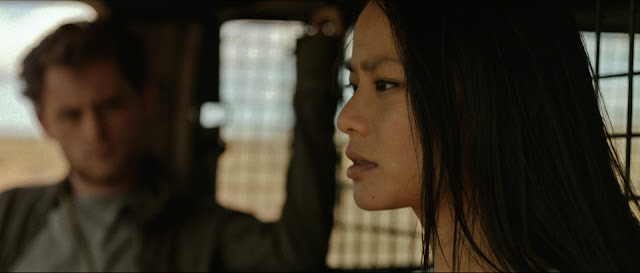The current Hollywood climate and the overwhelming ridiculousness of most of the big blockbusters being churned out of that machine is something that we talk about a lot over here at Bitch Flicks. The problems with a lack of unique female characters, general lack of original plot and substantive dialogue are just a few of the major problems going on right now. But on top of that has been a trend I recently noticed concerning our portrayal of sex trafficking as a tool to demonstrate the general kick-ass, uber-masculine, damsel-in-distress saving, action star. Specifically, I’m talking about the films Taken, Taken 2, and Trade.
In this case, the horrific abuse that is the daily life of many sex trafficking victims is wantonly used as mere shock factor, and in the process, allows a seedy voyeurism of the acts of torture and sexual assault that happen in such films. Does it do more harm or good to have such shocking and graphic scenes portrayed so cavalierly? For instance, the harm comes from using shocking scenes as a way to drive up viewership and glamorizing a very real global human rights violation; the good comes from the fact that these intense films do have a large viewership and in that, those films can spread awareness of the issue.
The issue is a complicated one and I have written about it for other venues here, but despite the fact that there are some very problematic films about sex trafficking running around out there, there are also some very good ones. Specifically, the 2012 film, Eden, directed by Megan Griffiths and just released on DVD last month.
 |
| Jamie Chung as Eden |
Eden is based off the true-life story of Chong Kim (Jamie Chung), a young Korean American woman who was kidnapped and sold into sex slavery in the United States. Many do not realize that the United States is unfortunately a huge participant in the importation and the exploitation of immigrations and US citizens in the global sex trafficking trade.
Eden chronicles Chong’s two years of experiences in a well-connected, organized prostitution ring within the American Southwest. Chong (renamed Eden by the organization) begins to climb the ladder of her own organization as a way to survive and eventually escape, an action that fully demonstrates the twisted reach of the organization.
Eden is a slow-moving tale, one that takes time to develop and highlight the changes and trauma that are influencing Chong, allowing the story, and Chong’s character, to grow as a result. The film is episodic in nature, skipping ahead to highlight significant moments within her capture and showcasing the passage of time.
As well, the fact that the United States has a substantial piece of the sex trafficking trade is exposed in this film. Eden is grounded in the US experience, even showing Chong within a standard US suburb being shuttled too and from homes as a prostitute. The landscape is familiar, as are the men and women she comes into contact with; it’s horrifying to realize how easily sex trafficking and its victims slip in and out of American life.

Jamie Chung as Eden–making her way up the ladder of the organization
Chong is an American citizen, and Eden portrays how many of the women are young American youths who have been sold or have run away from home. But Chong also has Asian heritage from her Korean parents, which means that in the film she must pretend to be an underage Chinese prostitute as a gimmick to get clients, a horrifically true detail that Chong Kim talks about here in an excerpt (page 11-12). Immigrants are usually considered the largest target of sex trafficking. It’s horrible to realize that such a situation is considered sexually desirable by some who use prostitutes.
But the film never explicitly shows the rape or torture scenes. We are aware of what’s happening and even of the effect that these actions have on Eden, but neither are we made to be participants in the same actions that the film is portraying. In fact, in this instance, not showing is a far more effective tool in demonstrating the seriousness and reality of sex trafficking. Instead of the focus being placed on the gratuitously violent rape-torture scene, the focus can instead be placed on how this trauma is affecting her, how the organization operates, and its insidious place within much of mainstream society.
Rather than focusing on the big man coming to save her, Eden is about her experiences, how she learns to survive, how she uses her own resources to facilitate her escape. That’s not to say that sex trafficking victims should in any way shape or form be responsible for their removal from sex trafficking, but it is important that films don’t just use sex trafficking as an action movie plot device.
Eden may be a little slow-moving, and I think it could have been longer, giving even more time to show Eden’s development and the effects of sex trafficking, but on the whole, Eden is a fine independent film, by a young and upcoming female director. We need more films telling subtle and focused stories about the thousands of victims of sex trafficking around the world.
Rachel Redfern has an MA in English literature, where she conducted research on modern American literature and film and its intersection; however, she spends most of her time watching HBO shows, traveling, and blogging and reading about feminism.
